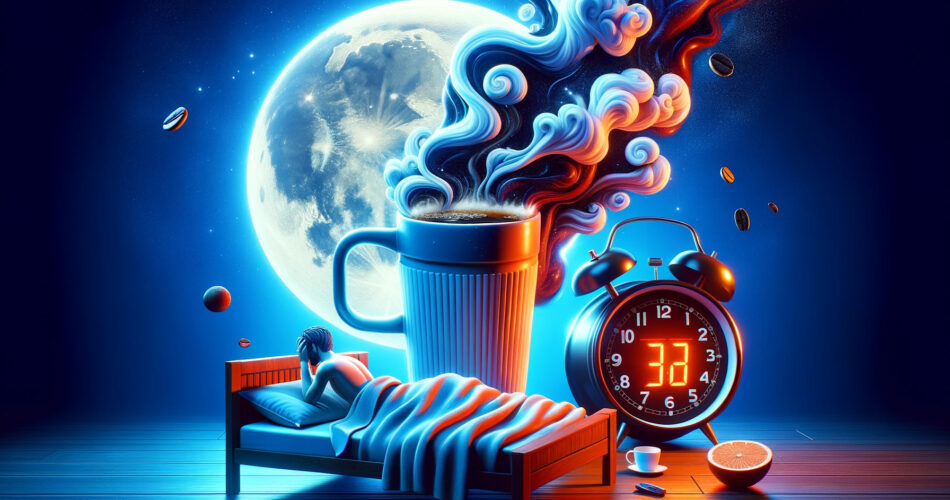Can and How Does Caffeine Affect My Sleep?
Let’s cut to the chase: caffeine can significantly disrupt your sleep. It’s a powerful stimulant that blocks adenosine, a chemical messenger that makes you feel sleepy, delaying your sleep schedule and reducing the total sleep time. It doesn’t stop at just pushing away the sandman for a few extra hours; it can also affect the quality of sleep, leading to a night of more tossing and turning than deep dreaming.
The Sleep-Caffeine Conundrum in Numbers
But how long does the buzzy trespasser linger in your system? Imagine a stopwatch; caffeine has a half-life of about 3 to 5 hours. This means that half the caffeine you drank at 6 PM could still be partying in your bloodstream by 11 PM. We’ll spill more beans on the timeline effects later, so keep your eyes peeled (if you can keep them open, that is).
Deeper Dive: The Sleep Architecture Alterations
So you’ve got the speedy summary, but let’s dig a little deeper into the night’s landscape. We’re not just talking about falling asleep but also about the stages of sleep caffeine affects. It can shrink the time you spend in deep sleep, the restorative phase and mess with REM sleep, the dream stage, which could mean your brain’s nightly housekeeping and memory consolidation gets a tad neglected.
Charting the Caffeine Course Through the Night
Let’s get visual for a moment with a chart that’ll make more sense than counting sheep. Imagine a graph where one axis tracks time and the other marks the quality of sleep stages. Throw in a line for your usual sleep pattern, and then a jittery line after you’ve slurped some late-night espresso. The difference is stark less deep sleep, more light sleep, more awakenings. Now that’s a chart that tells a story.
Caffeine’s Timeline: Sips and Sleeplessness
Buckle up for a quick timeline tour. Caffeine doesn’t just hit you with a one-two punch; it prefers a drawn-out match over the night. After consumption, it’s rapidly absorbed, peaking in your blood within 15 to 45 minutes. Feeling awake yet? But remember, it sticks around, breaking down gradually, which means it’s subtly shaping your night long after you’ve put down the cup. Let’s break it down:
- 0-1 hours: You’re feeling the peak effects. You’re alert, awake, and let’s face it, you won’t be cozying up with your pillow anytime soon.
- 3-5 hours: Half-life revelation, you’re at a crossroads where half the caffeine is still throwing a rave in your system.
- 6-14 hours: The lingering guest, some people can feel the effects for up to 14 hours, especially if they’re sensitive to caffeine.
Infographics: Caffeine and Your Circadian Rhythms

Personalizing Your Caffeine Consumption
It’s not all doom and gloom, though. Everyone metabolizes caffeine differently. Factors like genetics, tolerance, and even medication can influence how long and how intensely caffeine can affect your sleep. It might be time to get personal with your caffeinated beverages, tracking when you drink them and how you sleep afterward could be just the detective work you need.
The Decaf Decision: An Alternative?
For those keen to enjoy the ritual without the restlessness, decaf might just be your knight in shining armor or knight in soothing chamomile, perhaps? It’s not entirely caffeine-free, but it’s close enough to let you maintain the peace treaty with your pillow.
The Final Sip: Key Takeaways for the Sleep Savvy
In the quest for quality sleep, caffeine is a bit like that friend who’s fun at parties but doesn’t know when to leave. By understanding its effects on sleep and your body’s unique response, you become the savvy sleeper who can enjoy the buzz without the bedtime blues. So, monitor your intake, respect your body’s signals, and sweet dreams will be less of a dream and more of a reality.
Key Takeaways:
- Caffeine is a stimulant that can delay sleep onset and reduce overall sleep duration.
- The substance interferes with adenosine, a chemical that promotes sleepiness, affecting sleep quality.
- It has a half-life of 3 to 5 hours, meaning it can remain active in the body for several hours after consumption.
- Caffeine consumption can reduce time spent in deep sleep and disrupt REM sleep, impacting brain functions like memory consolidation.
- Individuals metabolize caffeine differently due to factors such as genetics, tolerance, and medication.
- Decaf beverages can be a suitable alternative for those looking to reduce caffeine’s impact on sleep.
- Monitoring caffeine intake and observing its effects on sleep can help maintain healthy sleep patterns.


Comments